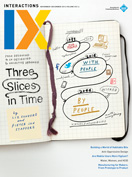Authors:
INTR Staff
 Smart Energy in Everyday Life: Are You Designing for Resource Man?
Smart Energy in Everyday Life: Are You Designing for Resource Man?
By Yolande Strengers
July - August 2014
DOI: 10.1145/2621931
With the advent of electricity at Menlo Park by Edison and its underlying scientific and commercial foundation, the emergence of Resource Man seems inevitable. Resource Man, with all his relations to Homo economicus, Homo faber, Homo optionis, and Homo sociologicus then is no one but the ghost of Menlo Park. He rightfully haunts us.
Resource Man, with all his relations to Homo economicus, Homo faber, Homo optionis, and Homo sociologicus, is no one but the ghost of [Edison's] Menlo Park.
While evoking Dewey's and James's ghosts to come and fight the ghost of Menlo Park seems like a strategy, I wonder how many would bet their dollar on it?
Karthikeya
 Beyond Video Games for Social Change
Beyond Video Games for Social Change
By Michael Horn
March - April 2014
DOI: 10.1145/2568372
Thank you for this insight. I am a community worker in Ireland looking at online gaming as a mechanism for mobilizing marginalized groups. The "gaming for social change" initiatives were useful but lacked "tangible interaction," which is a key element in the community development process. I would be interested in learning more!
Paul Keating
 BLOG/MONICA GRANFIELD: Preaching to the Choir, Just When You Thought It Was Safe
BLOG/MONICA GRANFIELD: Preaching to the Choir, Just When You Thought It Was Safe
http://interactions.acm.org/blog/view/preaching-to-the-choir-just-when-you-thought-it-was-safe
Medicine X—"the world's premier patient-centered conference on emerging technology and medicine" (see http://medicinex.stanford.edu)—is largely about human-centered design and the patient experience. This is a fabulous conference that brings together a wide range of healthcare professionals and designers and patients. In my view, this kind of conference is better than a conference silted on one profession at which one or two UX/CX people speak.
Richard Anderson
 BLOG/DAVID FORE: Big, Hairy, and Wicked
BLOG/DAVID FORE: Big, Hairy, and Wicked
http://interactions.acm.org/blog/view/big-hairy-and-wicked
So true! I often find we designers want to talk all about what needs to change, and that design thinking can tackle these problems, but the how is ever elusive. How do you affect big systems? These books are good guides for starting to answer that question.
Lauren Ruiz
 BLOG/ELIZABETH CHURCHILL The New Gmail Interface: Better or Worse?
BLOG/ELIZABETH CHURCHILL The New Gmail Interface: Better or Worse?
http://interactions.acm.org/blog/view/the-new-gmail-interface-better-or-worse
Elizabeth, could you update this blog or at least add some new comments? I enjoyed this post because I despised the new Gmail interface the moment I tried to use it. I quickly switched back to the old interface. I did not stick around long enough to discover the flaws you cite, but they would have infuriated me, as I too use the features that supposedly nobody uses anymore. The big surprise for me is this idea that the old interface "is going away soon." It is over a year since your post, yet Google has still not taken it away from me. Did Google honchos change their minds?
Or should I be frightened?
Slade Barker
©2014 ACM 1072-5220/14/11 $15.00
Permission to make digital or hard copies of all or part of this work for personal or classroom use is granted without fee provided that copies are not made or distributed for profit or commercial advantage and that copies bear this notice and the full citation on the first page. To copy otherwise, to republish, to post on servers or to redistribute to lists, requires prior specific permission and/or a fee.
The Digital Library is published by the Association for Computing Machinery. Copyright © 2014 ACM, Inc.







Post Comment
No Comments Found